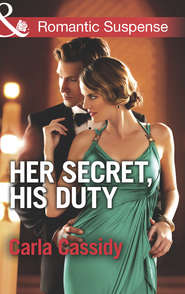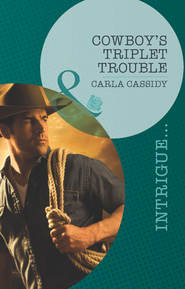По всем вопросам обращайтесь на: info@litportal.ru
(©) 2003-2024.
✖
Romancing The Crown: Drew and Samira: Her Lord Protector
Автор
Год написания книги
2019
Настройки чтения
Размер шрифта
Высота строк
Поля
‘‘Lorenzo Sebastiani.’’
A blink cleared some of the boredom from those fine, dark eyes. ‘‘Pardon me, Your Grace, for failing to recognize you. You seem to have left your coronet at home.’’ When she glanced at Drew her brows lifted in haughty inquiry. ‘‘You aren’t a Sebastiani.’’
‘‘No. Call me Drew, Signorina Giaberti.’’ His smile suggested that if she didn’t call, he would. Soon. ‘‘It is signorina, isn’t it?’’ There was no ring on her left hand.
Her mouth twitched in amusement. ‘‘And if it isn’t?’’
‘‘Life is seldom fair, but rarely is it that absurdly malignant.’’ For some reason his bantering tone slipped, as if he’d spoken nothing more than the truth.
She tipped her head, curious, and met his eyes.
The hairs on his forearms stood on end. He looked into those dark eyes and he knew—he was going to have her. When and where didn’t matter. He would have this woman naked and damp and crying out for him.
Her eyes widened. A small, alarmed jerk of her head snapped the contact.
‘‘Signorina Giaberti called in the bomb threat,’’ Captain Mylonas announced with relish.
It took a second for Drew to throw off the odd spell and understand what the man had said. When he did, his stomach contracted in quick, hard denial. But however his body rejected the implications, his mind knew very well that lovely packages could hold ugly surprises. Yet he still wanted her.
How far had he sunk?
The woman was unimpressed by the implicit accusation. Her glance at the captain was annoyed, no more. ‘‘Madre di Dio. It was a warning, not a threat. You might consider thanking me.’’
‘‘Thanking you? For attempting to kill hundreds of innocent people?’’
‘‘I tried to kill no one. If I hadn’t called, the building wouldn’t have been evacuated and the fire—’’ She broke off suddenly. ‘‘I warned you about the bomb. I didn’t threaten you with one. The distinction may be subtle to one of your intelligence, so I will give an example. If I say that looking at your smug, shiny face might cause me to lose my supper, that is a warning. If I say I’m going to vomit all over your pretty uniform unless you go away, that is a threat.’’
Drew choked on a laugh, then doubled over as another coughing fit hit.
Lorenzo took a step towards him. He waved his cousin back, stepping out into the hall so he wouldn’t interfere with the interrogation while his body tried to eject the lining of his lungs. He ended up leaning weakly against the wall, eyes watering as he dragged deep breaths through his raw throat. His head pounded, a hard, hot throb of pain. He blinked the moisture back.
One of the police officers was staring at him. Bloody hell. In another minute he’d have the fool over here asking if he needed medical attention. He made the effort to straighten, glancing down at the scuffed white tiles of the floor…
And the world slipped behind a wall.
Sounds, color, vision—all were still there, but removed. Distant, as if everything had slid behind glass. The pain in his head went from a throb to a long slice of agony.
Not again—please, not now. Not again.
But his plea was as trapped as the rest of him. As if someone had taken a grip on two corners of the world and pulled, the square tiles of the floor stretched into parallelograms. Pain became pressure, livid, explosive, almost living, as if it could burst out of his skull and splatter his brains on the white, elongated tiles. He tried to move, to at least close his eyes. And couldn’t. He could only stand frozen while the tiles melted and the beast behind his eyes rose in a huge wave—
As suddenly as it had come, it was gone. The tiles dragged themselves back into their proper shapes, the pressure receded, tidelike, leaving him cold and clammy and weak. Last to go was the wall, the glassy barrier that muffled everything…
‘‘…all right, sir?’’
He looked up. The officer he’d seen earlier was standing in front of him, looking very young in a soot-smudged uniform. Those spaniel eyes hadn’t yet learned a cop’s detachment.
Drew dredged up a reassuring smile. ‘‘Afraid I inhaled too much smoke earlier. I’ll be fine.’’
As fine as a man could be, that is, when he was losing his mind.
Chapter 2
Montebello was a tiny island with a long history. Conquered, traded, overrun and reconquered, its 3,100 square miles—less than half the size of Wales, smaller than forty-eight of the United States—held detritus from more than two thousand years of bloody civilization. A farmer’s plow might turn up Roman coins, an Assyrian ax head, Egyptian pot shards or a handful of spent casings from a machine gun used by Mussolini’s occupying army. As Drew’s limousine climbed the stubby mountains that separated the airport from the capital city, it passed goats grazing in a tumble of hewn rocks that had once been the walls of a Byzantine monastery.
The Turks had destroyed that monastery after the fall of Constantinople in 1453. Beneath the highway’s smooth modern paving lay earth once tramped by Roman legions, who had brought law and the cult of Aphrodite to this small, fertile island. Muhammad’s followers had walked here, proclaiming the oneness of God with curved scimitars while their mathematicians brought to the world new ways to measure its bounds. The militant Knights of St. John and the secular knights of Richard I arrived with their straighter swords a century later, housing God in different architecture. They also brought to the island those practical mysteries of commerce and government that supported the growth of a new class—a middle class.
Soon, though, they lost the island to the Doge of Venice. The local nobility didn’t fare well in that change of power, but the growing class of artisans and traders prospered under a ruler entranced with the glittering possibilities of commerce. The Venetian branch of a northern Italian family, the Sebastianis, invested heavily in the island and eventually moved there.
Not until Napoleon overran Europe did the little island taste autonomy. The French Emperor claimed it along with his Italian territory, but he had no troops to spare for so distant a possession. The local mechanisms of government persisted, but no one was truly in charge—at least, no one the locals could agree on.
A small, prosperous island without a strong defender wouldn’t be allowed to dabble in sovereignty for long. Augustus Sebastiani, by then a Duke, stepped into the temporary vacuum and by a combination of trickery and economic clout made himself the de facto head of state. He forestalled any violent courtships by Montebello’s acquisitive neighbors with a series of canny trade agreements and marriages. One Sebastiani daughter went to France, another to a Spanish prince, while the oldest son took a noble English bride.
This hedging of bets through arranged marriages proved wise when, after Waterloo, Europe divided the spoils and England acquired Montebello and held it in a loose and friendly grip. In 1880, either from altruism or a lack of interest, Great Britain bestowed the island upon its people in the person of King Augustus Sebastiani, who promptly married an English noblewoman with ties to the British throne.
The Sebastianis had ruled ever since. In some ways the family personified the results of the island’s long and bloody history—a mingling of races, religions, tongues and cultures that had produced a people both passionate and pragmatic. Over the years the ties with England had been strengthened through commercial and political agreements —and once more, thirty-seven years ago, through marriage. Montebello’s ruler, King Marcus II, had married an English noblewoman connected to the British throne—Lady Gwendolyn Sebastiani, née Peterson. Drew’s aunt.
In the quiet, cushioned luxury of the king’s limousine, Lord Andrew Harrington passed through the outskirts of the capital without seeing the lights, the old buildings leaning at age-settled angles or the new ones, briskly upright.
He was counting.
Exhaustion had hit the moment the spell passed, a great, gray, sucking swamp that experience told him would eventually drag him down. Once he gave in he would sleep for hours, sleep so deeply he might as well be unconscious, doped or dead.
Drew hadn’t come here to scare his relatives to death by arriving unconscious. Nor did he want to be admitted to the hospital for a malady the doctors wouldn’t be able to identify or remedy. He might not be able to avoid the gray tide entirely, but he could postpone it. This, too, he’d learned the hard way.
…ninety-eight, ninety-nine, one hundred.
Sweat stood in suspended drops on Drew’s forehead as he released the muscles he’d held mercilessly taut in his left calf, then clenched those of his thigh. And began counting again.
Movement helped stave off collapse. Concentration helped, especially when turned to the cool realm of business. But he couldn’t move in the confines of the limo, and his laptop and briefcase had been left behind, with his luggage, at the airport. So he substituted a slow counting while isolating and tightening the muscles of his body. Holding each clenched set of muscles to the point of pain before he released it and moved on to the next.
Pain, too, helped.
At last the elongated luxury of the limo was climbing the cobblestone road to where the palace waited, pale and pristine in the moonlight, at the top of the cliffs capping the northeastern tip of the island. When Drew stepped out of the limo, the night air covered him, freshened by the ocean and the distinctive smell of northern Montebello, where oregano and thyme grew wild. The spicy scent mingled with the headiness of his aunt’s roses.
He wished he could pass through the gardens instead of the palace, take the rocky path down the cliff and walk along the beach, alone with the sea and the night. He wished, in fact, he could go anywhere but through the ornate doors at the top of the stairs. Once inside, he would have to deal with the people he loved. His inadequacies in that area were always painfully obvious. But even if he’d been willing to play the coward, the tide that waited to drag him under made that a foolish choice. Drew didn’t care to delight the paparazzi by passing out on the beach. He’d sold enough copies of their rags for them in his younger, wilder days.
Grimly he started up the steps. There were thirty-two of them.
Rudolpho, of course, waited at the door to admit him. ‘‘If you are not too tired, my lord,’’ the old man said in his excellent English, ‘‘the king wishes to see you before you retire. He and the queen are in their quarters. Shall I send up some refreshments?’’
‘‘Coffee would be welcome, thank you.’’ Drew preferred tea, but an extra jolt of caffeine might help. ‘‘And if you could locate a clean shirt, I’d appreciate it. My luggage is still at the airport and I’d rather not present myself to the king stinking of smoke.’’
‘‘You can have one of my shirts,’’ a voice said from the grand staircase. ‘‘We’re nearly of a size. A clean pair of pants wouldn’t hurt, either, from the look of you. But why is your luggage held up? I trust no one became so carried away by some notion of duty that he refused to release it to you.’’
The unconscious hauteur of that last statement pulled a small smile from Drew as he turned to face his cousin. Lucas was a very approachable prince—but he was still a prince. ‘‘I didn’t want to take the time to dig through the piles to locate my bags tonight. Things are rather a mess still.’’
Lucas’s face hardened. ‘‘No doubt.’’ He glanced at the majordomo. ‘‘I’ll see Lord Andrew upstairs. You may send his coffee to my father’s rooms.’’











